Bola Tinubu's Nigeria election win: The rigging claims of Peter Obi and Atiku Abubakar
- Published
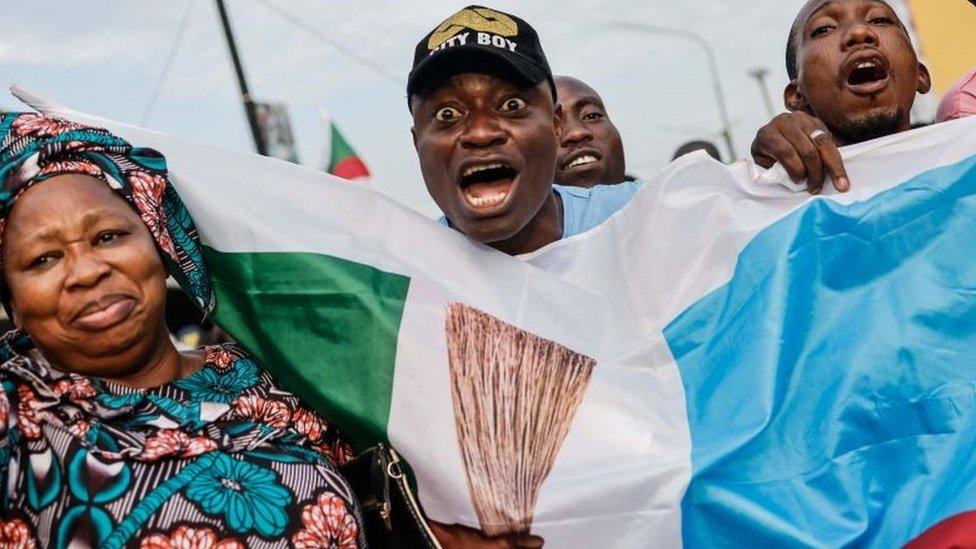
Bola Ahmed Tinubu has been declared the winner of Nigeria's fiercely contested presidential election but many, including opposition parties, have claimed the poll was rigged and a sham.
They have called for the election to be cancelled, alleging breaches of the Electoral Act and possible collusion by the Independent National Electoral Commission (Inec) to doctor the result in Mr Tinubu's favour.
The allegations have been denied by Inec and Mr Tinubu's party, the ruling All Progressives Congress (APC).
As for the opposition parties, they have so far not offered any concrete proof to back up their allegations.
But the Labour Party, whose presidential candidate Peter Obi came third, has said it will go to court to overturn Mr Tinubu's victory. It is yet to be seen what evidence it presents.
At the heart of the dispute is the newly introduced electronic voting system, known as Bvas, which was supposed to make the manipulation of results more difficult and the polls more transparent.
The widespread inability of electoral staff to upload results from polling units to Inec's server helped fuel allegations of a conspiracy.
Fears of rigging emerged on the morning of the election when a popular influencer alleged on social media that Inec's IReV portal, where results are meant to be uploaded, had been breached by hackers. This post has been viewed 1.4 million times on Twitter.
The BBC investigated the claim and found that the site referenced is a phishing site masquerading as the Inec website. Inec itself gave an assurance that its site was "well-secured", and could not be tampered with.
Later, as delays in uploading results to the server continued, four opposition parties, including the Peoples Democratic Party (PDP) and Labour, accused Inec of violating the Electoral Act by failing to transmit results to the IReV portal.
Inec's regulations and guidelines required that results be scanned and uploaded to the server from each of the more than 175,000 polling stations after being signed by party agents and election officials.
As he complained about the failure to upload results, PDP vice-presidential candidate Ifeanyi Okowa, in a joint press conference with his Labour counterpart, Yusuf Datti Baba-Ahmed, alleged that either Inec had "connived [with the ruling party] or their system was down".
"If the system was down and they knew it was down, then they ought to have postponed the election. If the system was not down, and they didn't allow the upload of the results in, [it] means that they have connived, and they are no longer neutral and impartial," Dr Okowa said.
Inec apologised for what it called "technical glitches", and said that any discrepancies between results on the portal and "physical results" would be investigated and resolved.
Inec also blamed delays on factors beyond its control, like the lack of internet access at some polling stations.
Staff then had to take the Biomodal Voter Accreditation System (Bvas), used to accredit voters and upload results, to Inec collation centres to do so, it said. There were also reports of voters allowing election officials to use hot-spots on their mobile phones to access the internet and so access the system.
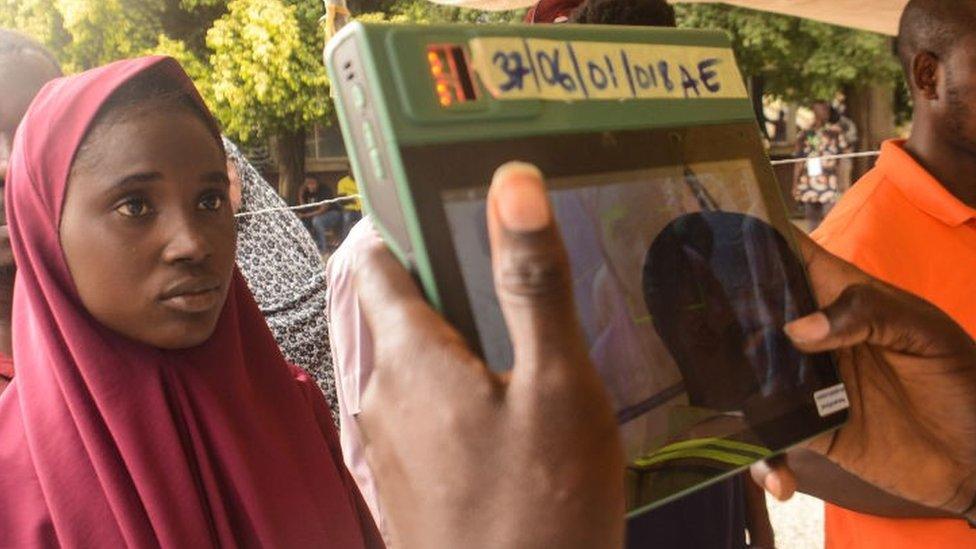
A new electronic voting system was aimed at preventing fraud in Nigeria's elections
But many people complained that the results of the presidential election were slower to upload than results from the parliamentary election held at the same time. Inec has not offered an explanation for this.
In other concerns raised by the opposition, the PDP's Dino Melaye, who led a walkout of some opposition party representatives from the results collation centre, alleged that there was over-voting in Ekiti - the first state to announce results, and which backed Mr Tinubu.
Dismissing the allegation, Inec chairman Mahmood Yakubu said the total number of votes cast in Ekiti, a stronghold of Mr Tinubu in south-western Nigeria, was less than the total number of accredited voters.
On claims on social media that the results from Ekiti were published five days before the elections, the Inec chairman said that such stories could only pass for "fake news".
There were also videos on social media showing voter intimidation and ballot-snatching, and violence at some polling stations, especially in the biggest state, Lagos - won by Mr Obi in a blow to Mr Tinubu - and Rivers state, which he won.
The BBC has confirmed the authenticity of some of these videos and BBC journalists arrived at a polling unit in Lagos just as thugs disrupted the voting process.
Barry Andrews, the EU's chief observer at the election, told the BBC there were several shortcomings.
"Broadly speaking we were able to see that there was evidence of vote-buying. It's too early for us to conclude how widespread this was," he said.
As well as the delays uploading the results, he noted "a clear anomaly between the fact that votes for the presidential election were not uploaded, whereas votes for the legislative elections were uploaded".
"Our message is very clear - that we would encourage any complaints to be brought through the appropriate legal channels. But our observations certainly bear out significant shortcomings in the electoral process," he said.
Several photos of ballots, said to show evidence of ballot-tampering, are also circulating on social media.
The BBC has checked some of the photos and traced them back to uploads on Inec's server.
The BBC noticed extensive alterations on some of the results uploaded, but can't confirm if they were altered maliciously.
There were also instances where, instead of uploading a photo of a presidential election result to the Inec website, mugshots of people appear to have been posted.
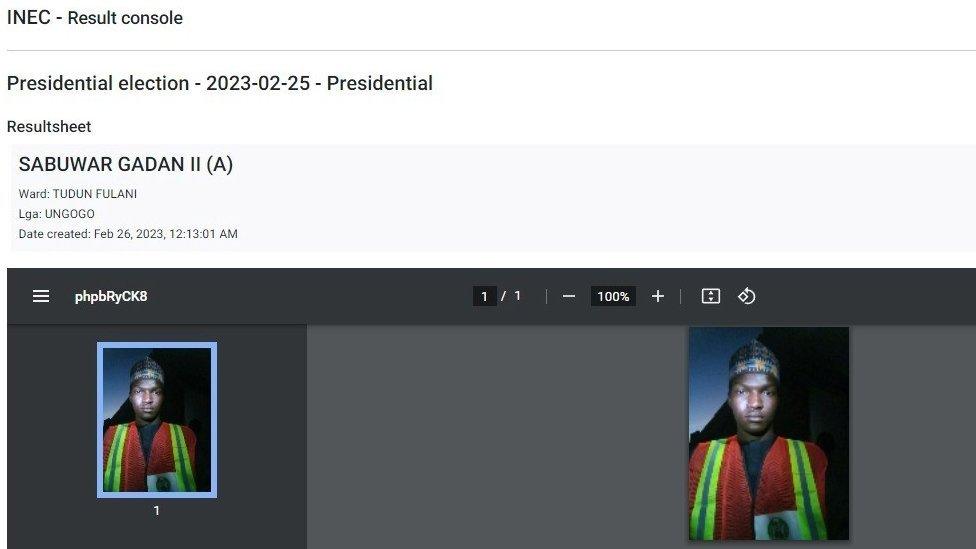
A mugshot of an unknown person, wearing what looks like an Inec electoral staff vest, appears where results should be
The BBC investigated two cases highlighted on social media.
In one widely shared video, someone navigates the Inec portal to review results from Ado-Ekiti, the capital of Ekiti state.
A photo of the presidential election results from that ward should be shown with the signatures of party agents. Instead, a photo of a woman is shown on the screen.
It is unclear how widespread such errors were, and whether they were the result of a lack of training or deliberate manipulation, but it will pile pressure on Inec.
The BBC also noticed a mix-up of presidential election results from some of Nigeria's 36 states. For instance, lots of results from Sokoto in the north were uploaded to where results from polling units from Rivers in the south should have been.
Sokoto was won by Mr Abubakar while Mr Tinubu won Rivers, which had been expected to back Mr Obi.
These wrong uploads, the BBC found, affected results in many states. But subsequent checks show that many of the affected polling units now have the right results.
The Electoral Act mandates that party agents, Inec officials, and the security officer in each unit will have copies of the signed results that is uploaded to the Inec server. As such, parties should have evidence of the original results to back up any claims that results have been changed.
There are viral posts online showing results purported to be from polling units where voting did not occur in reality, but the BBC has not been able to authenticate these.
Voting delays were observed across Nigeria. Many people waited from the morning until late at night to vote, but others gave up and went home. In some cases, Inec staff failed to turn up at all at polling stations. This has led to claims that opposition supporters were deliberately disenfranchised.
Online, ruling party supporters are pointing to losses suffered by Mr Tinubu - including in the capital Abuja and Lagos - as proof that the election was free and fair.
Mr Tinubu himself acknowledged there were lapses in the election but said they "were relatively few in number and were immaterial to affect the outcome".
However, many young people who backed Mr Obi in the vote have dismissed the whole thing as a sham.
The election was the most tightly contested since military rule ended in 1999 - and not surprisingly the result has proved to be deeply polarising.
Nigeria election results 2023: Up-to-date results of presidential and parliamentary races
Nigerians cast their votes in Saturday’s general election. They had 18 candidates to choose from for president and people also voted for senators and members of the house of representatives. The BBC is using data provided by Nigeria’s Independent National Electoral Commission (Inec) to tally the results.
Nigeria presidential results 2023
To win in the first round, a candidate must have the largest number of votes nationwide and at least 25% of the votes in two-thirds of the 36 states and Federal Capital Territory (Abuja)
Last updated: 19/04/2023, 18:00:24 local time (GMT+1)
Final results
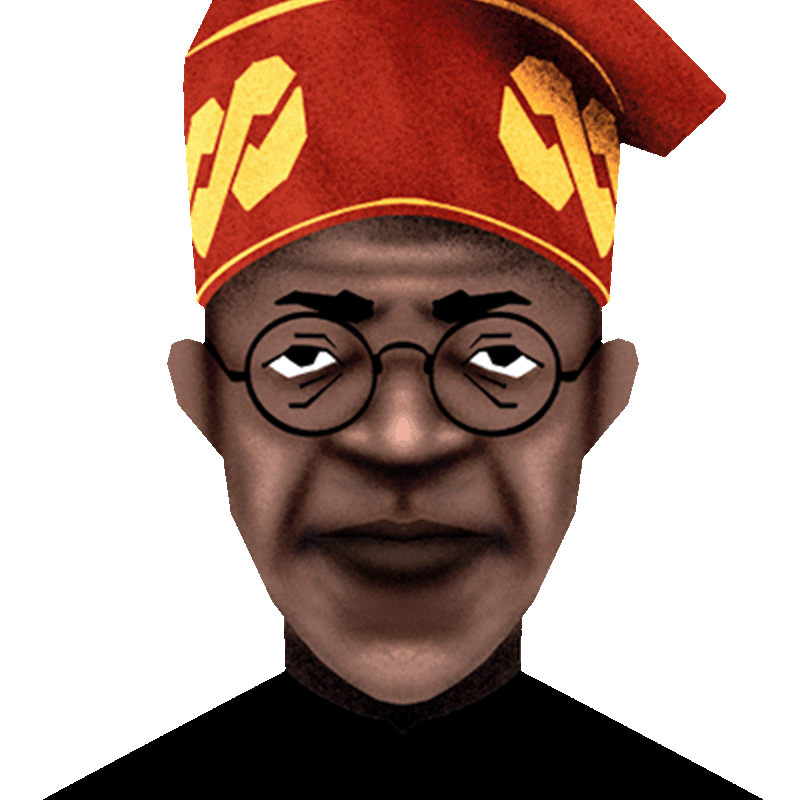
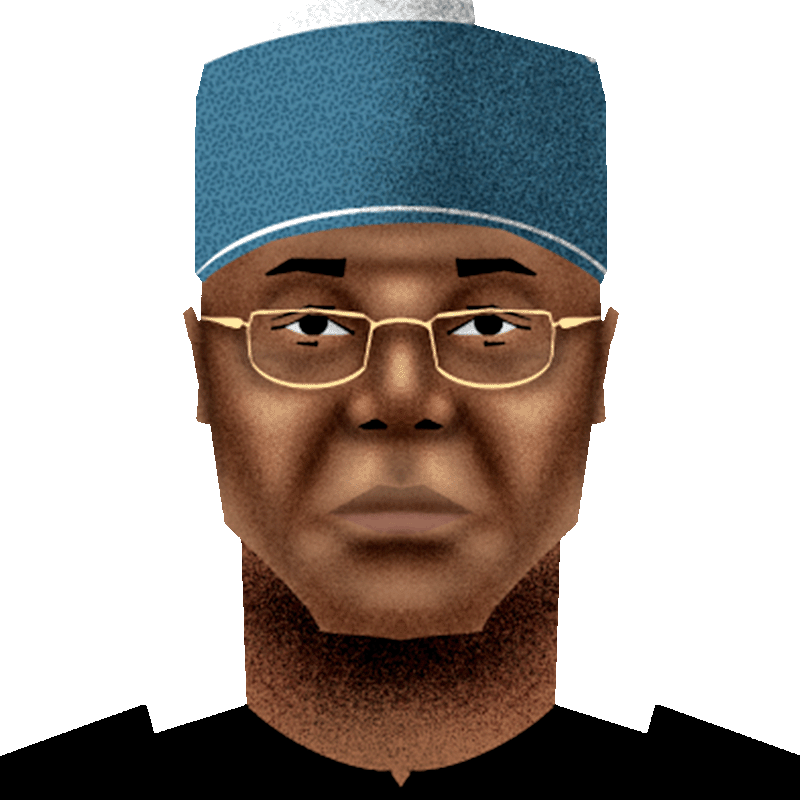
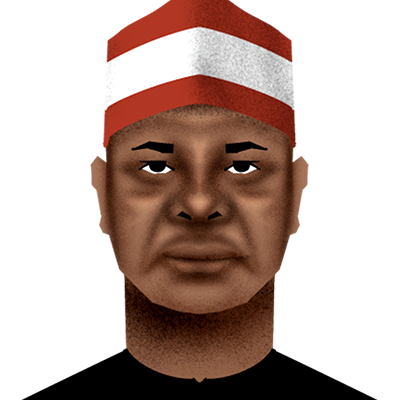
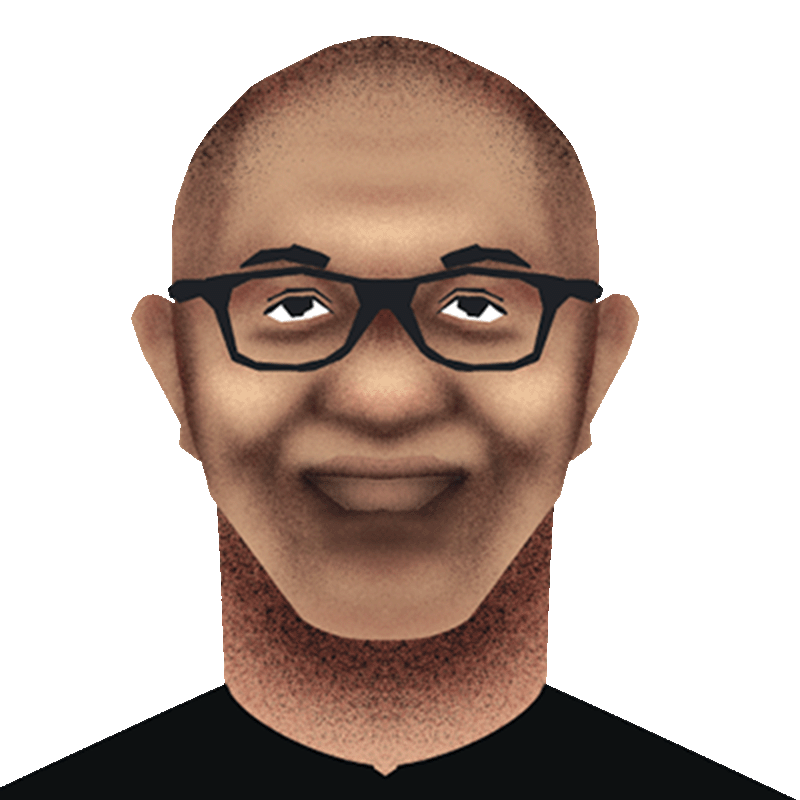

Nigeria presidential results 2023
To win in the first round, a candidate must have the largest number of votes nationwide and at least 25% of the votes in two-thirds of the 36 states and Federal Capital Territory (Abuja)
Last updated: 19/04/2023, 18:00:24 local time (GMT+1)
Final results





Presidential election results by state
Presidential election results by state
Last updated: 19/04/2023, 18:00:24 local time (GMT+1)
Click on map to see results in detail
Senate results by party
Last updated: 19/04/2023, 18:00:24 local time (GMT+1)
| Party | Seats |
|---|---|
| All Progressives Congress | 59 |
| Peoples Democratic Party | 36 |
| Labour Party | 8 |
| Others | 4 |
| New Nigeria Peoples Party | 2 |
House of Representatives results by party
Last updated: 19/04/2023, 18:00:24 local time (GMT+1)
| Party | Seats |
|---|---|
| All Progressives Congress | 159 |
| Peoples Democratic Party | 104 |
| Labour Party | 35 |
| New Nigeria Peoples Party | 18 |
| Others | 9 |
| Inconclusive | 35 |
Credits
Designers: Millicent Wachira and Olaniyi Adebimpe; Visual Artists: Mayowa Alabi and George Wafula: Data Journalists: Yusuf Akinpelu and Brian Osweta; Developers; Boaz Ochieng, Marcos Gurgel, Ayu Widyaningsih Idjajaand and David Ayoola; Project Lead: Dorothy Otieno.
More on Nigeria Election 2023
Related topics
- Published28 February 2023
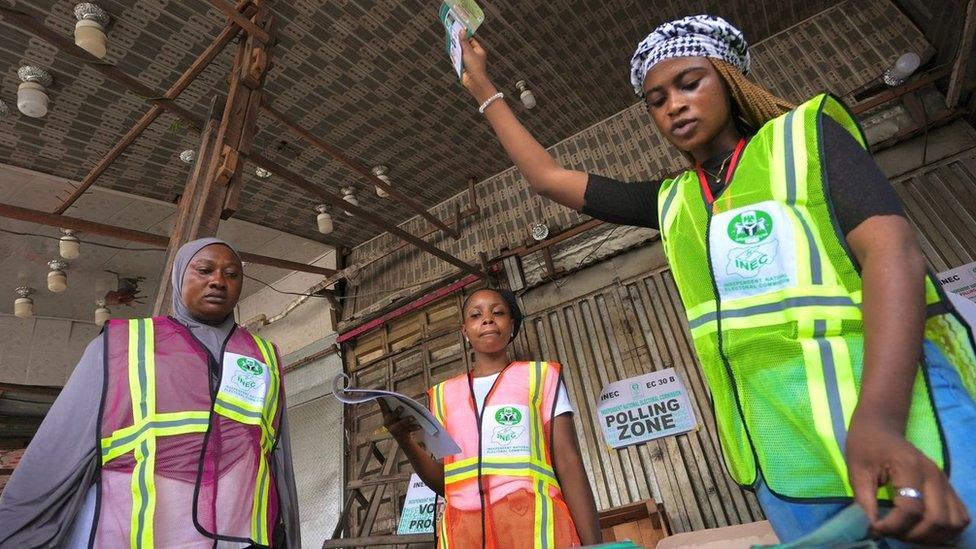
- Published24 February 2023
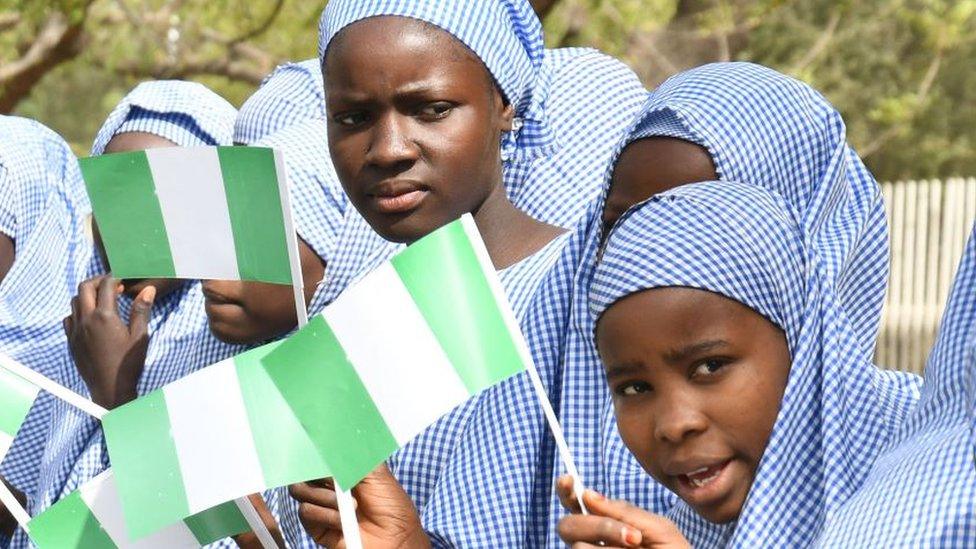
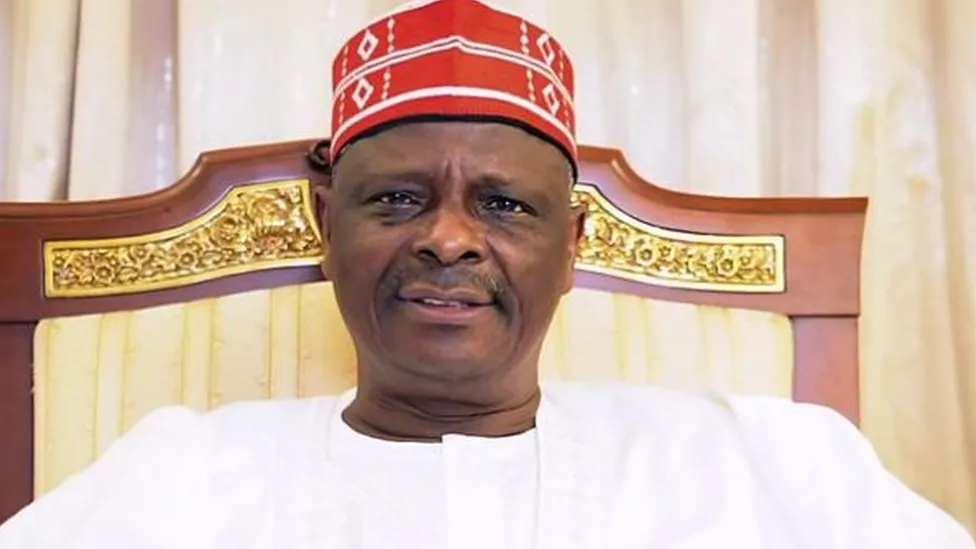 Who is Rabiu Kwankwaso?
Who is Rabiu Kwankwaso?
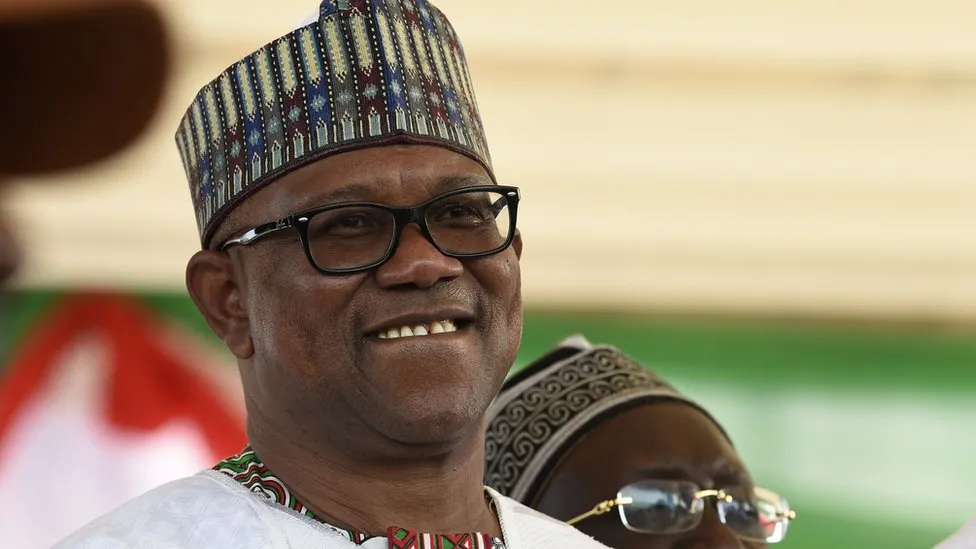 Who is Peter Obi of the Labour Party?
Who is Peter Obi of the Labour Party?
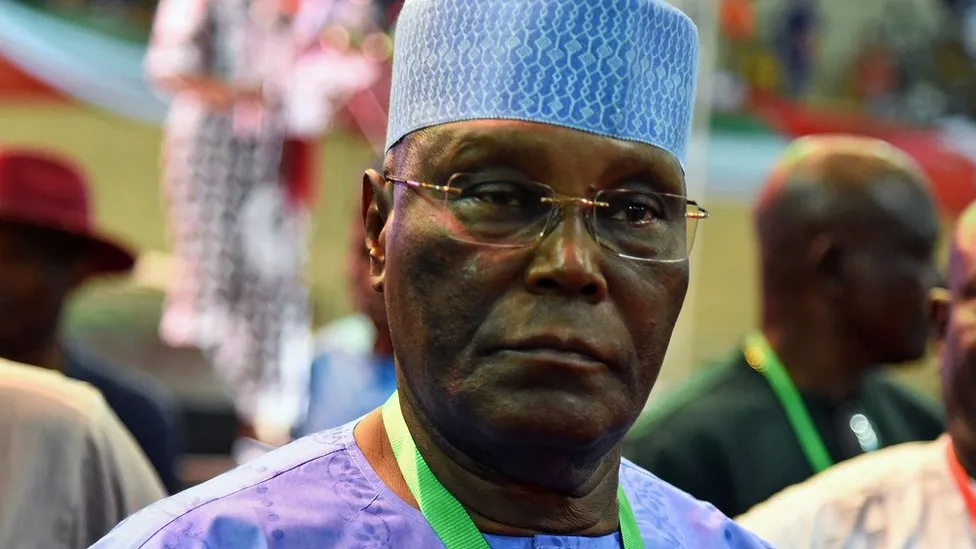 Who is Atiku Abubakar?
Who is Atiku Abubakar?
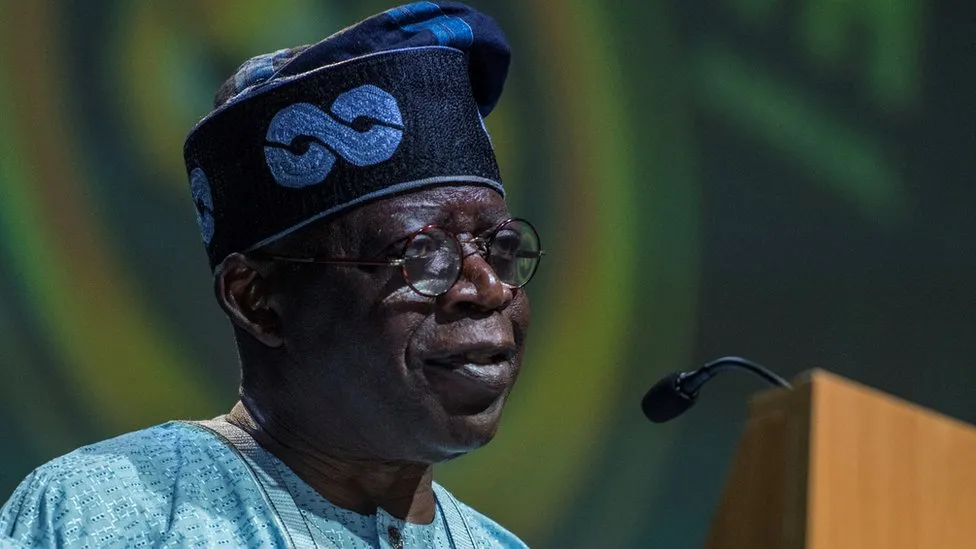 Who is Bola Tinubu of the APC?
Who is Bola Tinubu of the APC?